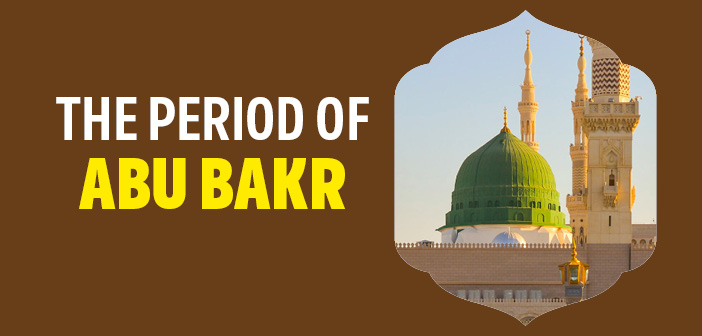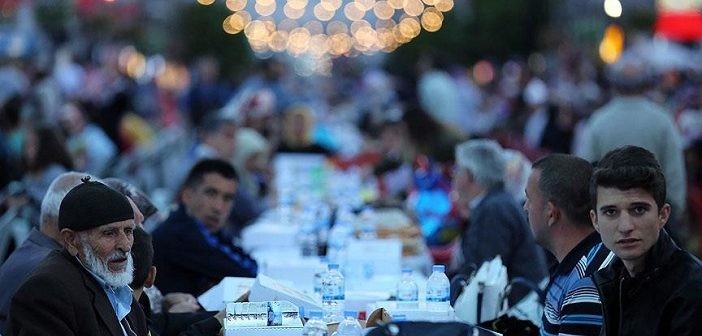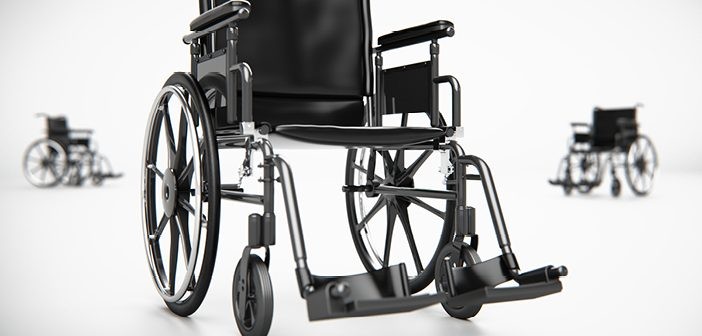
The Period of Abu Bakr
Who is the first caliph? Who is the abu bakr? What is the short life of abu bakr? Who is the first muslim caliph?
The Period of Abu Bakr (632-634)
Abu Bakr (May Allah be pleased with him) became the head of the Muslims in a very problematic time and worked for the unity and solidarity of Muslim society and for spreading and strengthening the Call of Islam. We can briefly list the important incidents that took place during the era of Abu Bakr as follows:
The Expedition of Uthama
Abu Bakr (May Allah be pleased with him) sent Uthama over Damascus after the burial procedures of our Prophet (pbuh) had been completed. The expedition lasted for about 40 days. The army returned with war booties and no casualties. Thus, the forces threatening the security of the Muslim State and its commercial and economic interests were eliminated (632).
The Fight with Those Who Converted out of Islam and Those who falsely Claimed to be Prophet:
After the death of the Prophet Muhammad (pbuh), rebellions and apostasy movements started to spread in various parts of the country (such as Middle Arabia, Yemen, Oman, and Bahrain). There was not any movement only in Mecca, Medina and Taif. However, Abu Bakr didn’t give up in the face of all those serious problems. Some of these rebels were the Arabs living in the desert who had just converted to Islam and couldn’t understand what Islam really was and why payment of almsgiving (zakat) obligatory in Islam. The Holy Qur’an describes us those people in the 14th to 16th verses of Chapter al-Hujurat (49): “The Bedouin say, “We have attained to faith.” Say [unto them, O Muhammad]: “You have not [yet] attained to faith; you should [rather] say, ‘We have [outwardly] surrendered’ - for [true] faith has not entered your hearts.”
Apart from these, some imposters who thought that Muhammad (pbuh) controlled the Arabian Peninsula by means of prophethood as well as some tribal racists and oracles claimed to be prophets. Deceiving and gathering people around them with some kinds of trick, they revolted against the Muslim state. Incidents of apostasy started to become so serious that they even dared to attack Medina, the capital city and the seat of the government of the Muslim state. Abu Bakr followed a very wise strategy against those extremely important and delicate developments. He commanded the distinguished commanders, powerful and important people of Muslim society by appointing them as flag bearers to fight against the apostates without delay. The number of the commanders that Abu Bakr charged was about 11. Khalid b. Walid, Ikrima b. Abu Jahl and Amr b. As were among these commanders. Within less than two years after these incidents, disorder and apostasy incidents were stopped, everything was taken under control.
Compilation of the Holy Qur’an into a Book Form
The Holy Qur’an was written down by revelation scribes and also memorized by Muslims at the time of our Prophet (pbuh). However, it wasn’t collected in the form of a book.
Many companions knowledgeable in the Qur’an (qurra) and those who memorized the whole Qur’an (hafiz) were martyred in the battle of Yemame which took place during the Caliphate of Abu Bakr (r.a.). Umar and many companions got worried because of that and they warned the caliph in this respect. Abu Bakr established a committee under the leadership of Zayd b. Thabit, one of the revelation scribes, to collect the pages of the Qur’an. With the rigorous works of the committee, the pages of the Qur’an were completely compiled and it was delivered to Abu Bakr (r.a.) as a “Mushaf (book).” This mushaf was later on entrusted to Umar (r.a.) and after him it was handed over to Umar’s daughter and one of the mothers of the believers Hafsa. During the time of caliph Uthman, this main mushaf was copied and sent to various centers of the Muslim state.
Conquests during the Era of Abu Bakr (r.a.):
Byzantium and Persia were the two powerful states of that time. There happened wars against Byzantium during the time of our Prophet (pbuh), as well. The movements of conquests over the land of Byzantine began during the time of Abu Bakr (r.a.)
a) Conquests in the Region of Iraq
After being elected as the caliph and establishing peace in the society, Abu Bakr (r.a.) continued the conquests that our Prophet (pbuh) had started. Khalid ibn al-Walid, who was charged with the conquest of Iraq went up to Hire and had an agreement with the community there with the condition of accepting to pay jizya (poll tax) (633). On the one hand people worked to spread Islam, on the other hand new places were conquered. Fertile lands extending from the Persian Gulf to the north up to the banks of the Euphrates River were added under the authority of Islam in a short period of such as one year.
b) Conquests in the Region of Syria
Abu Bakr prepared four armies and sent them to Syria. First Amr b. As and after him Ubayda b. Carrah was appointed as the chief commander. Learning that the Byzantine was getting ready for an attack, Amr b. As asked from the Caliph to send reinforcements. Thereupon Khalid b. Walid came from Hira to Marj-i Raahit and defeated Gassanis. After receiving the news, Byzantine troops marched towards Ajnadayn. Amr and Khalid who also came to Ajnadayn defeated the Byzantine army (634). With Muslim army’s victory in Ajnadayn, the gates of the Palestine were opened to the Muslims. At that time Abu Bakr passed away and Umar was elected as Caliph. New Caliph appointed Abu Ubayda b. Jarrah as the commander of the army.
At the beginning of the year 14/635, Muslim army laid siege to the city of Damascus. The commanders were Amr b. As, Khalid b. Walid, Abu Ubayda, Shurahbil and Abu al-Darda . The siege lasted long, hunger and famine emerged in the city. Khalid entered the city from the eastern gate without fighting, while Abu Ubayda entered the city from the western gate by fighting, so the city was conquered. With the conquest of Damascus, Muslims ended the 1000-year long authority of the Roman Empire in the city.
The real battle with Byzantine forces took place at the banks of Yarmuk River. The Byzantine army was heavily defeated by the Muslim army. While Muslims were busy with this war, the news of the death of Abu Bakr reached the army. The commanders kept the news secret from the army and continued to fight; because getting defeated in this battle was going to mean wasting everything that had been done by that time. So they fought by showing a great heroism, courage and power. Just like Qadisiyya war that was won in Iraq (14/635) was a turning point of the victories against the Iranians, the Victory of Yarmuk also formed the basis of the successes that the Arabs achieved in the region of Damascus. This event has an important place among the other Islamic conquests which were carried out in the region of Damascus. Because the success and victories that Muslims gained in this war led them to keep on their conquests and increase their efforts and supports and on the other hand it caused the Romans to be weakened and defeated. So Muslims won their greatest battle ever. After the year of 636, Christians totally lost their authority in Syria and Muslims gained the control.
The Death of Abu Bakr
Abu Bakr got sick in the year 634 and wasn’t able to go out to the mosque anymore. He handed the duty of imamate over to Umar. He had also told that it would be convenient for Umar to be the Caliph after him. He died in 23th August, 634 (L.13). His funeral prayer was performed by Umar and he was buried next to our Prophet (pbuh) in Rawza-i Mutahhara.
The Personality of Abu Bakr
Abu Bakr had unshakable belief in the Holy Qur’an and the prophethood of Muhammad (pbuh). Indeed because of this characteristic of his, he was given the title of “siddiq (eminently truthful)”. The Prophet (pbuh) expressed the strength of his faith with the following words: “When I was sent to you by God all of you called me “liar” except Abu Bakr. He believed in me and accepted me. He helped me with his life and property.”
Abu Bakr was a brave and determined man. He practiced the opinions which he believed to be the right thing without any hesitation. Beginning from the first days of Islam, he always supported it and the Prophet (pbuh) with all his heart and strength. In this respect nothing could stop him. He continued to be determined even after the death of the Prophet (pbuh). With his strong and sound will, he easily solved the serious problems emerged after the death of the Prophet (pbuh).
Abu Bakr was a humble, gentle and kind person. He never acted superior to anybody. When someone praised him he used to say “My Lord! You do know me better than I do myself.” He would get very angry with arrogant people. When necessary, he showed bravery and boldness, but he was able to control his anger. He always maintained his solemnity. He was merciful and generous. His generosity reached such a high level that he could spend all his property for the sake of Islam.
He was a pious and religious person. He didn’t worship idols even in the Age of Ignorance. He avoided all kinds of immoral acts of that era and didn’t have friendships with immoral people.
He was contented. After he was elected as the caliph, he wanted to continue to do trading which was his old occupation. He took some clothes with him to sell and went to market. He came across with Umar on the way to market and Umar told him that he took over governing the affairs of the Muslims, and if he kept on trading, the tasks of the state would be failed. Upon this, Abu Bakr asked: “then how am I to feed my family?” Umar took him to Abu Ubayda the officer of bait al-mal (treasury), and took care of the arrangements to put Abu Bakr on a salary. Abu Ubayda assigned for the caliph food of an average Muhajir (immigrant Muslim) and two pieces of clothing for the summer and winter and told him that whenever his cloth gets old, he should bring them and exchange them with the new one.
As seen, Abu Bakr confined himself to live with the amount he received from the state treasury which was just enough to feed himself and his family. He didn’t regard his caliphate as a means to increase his own fortune and to male financial benefits out of it. He confined himself with the amount of the expenses of an average citizen. When he was about to die, he told his daughter Aisha to deliver the camel which they milk, the container in which they paint their clothes and the velvet dress he wore to Umar after his death. He explained the reason of his request saying that he got those things in return for governing the affairs of the Muslims.
When there was an issue to be consulted, the Prophet would especially ask Abu Bakr’s opinion. Abu Bakr was also known with his knowledge and his literary personality. He was one of the few literate people at that time. He was one of the scribes of Prophet, even one of the scribes of the revelation. The Prophet would take Abu Bakr with him when going out of Mecca.
Abu Bakr knew the whole Qur’an by memory and he could recite it very well. He was one of the companions from whom the different ways of recitation (wajh) were narrated. He also knew the interpretation of the Holy Qur’an like he knew its literal meaning very well. The Prophet put him in charge of leading the prayers in place of him, which shows the strength of Abu Bakr’s knowledge of the Holy Qur’an.
Abu Bakr also knew the sunnah of the Prophet. The Companions consulted him about various matters and he delivered what he learnt from the Prophet to people.
As for his administrative and military character, during his 2-year long caliphate, he established peace and tranquility in society by ending the ridda (apostasy) incidents. He also established the unity among the Muslims. Later, he attempted to conquer the neighboring two major states, i.e. Iran and the Byzantine, and succeeded in this attempt. His administrative and military skills had a big role in these achievements. He was a statesman who knew how to act in both domestic and foreign policy. He attached importance to consultation. He chose the army commanders from those who could properly do the task. He would not neglect to give them useful and necessary tactics. He would thoroughly inquire about the conditions of the region to which he sent the army and make the necessary arrangements according to his findings. He was meticulous about meeting army’s needs for weapons and other equipment. He would secretly inspect his governors and listen to people’s complaints. When he came across with an injustice he would try to eliminate it. He said that “The weak among you shall be strong with me until their rights have been vindicated; and the strong among you shall he weak with me until, if the Lord wills, I have taken what is due from them.”
Conclusion: Abu Bakr united the Muslims who were in danger of dissolution after the death of the Prophet (pbuh), established the state authority again, compiled the Holy Qur’an into a book form, managed to spread Islam out of the Arabian Peninsula through Syria, Palestine and Iraq for the first time. Moreover, he was called as Halifat al-Rasulullah (Caliph of the Prophet).
Source: Islamic History Book, Erkam Publishing.
https://www.islamandihsan.com/abu-bakr-as-siddiq.html











